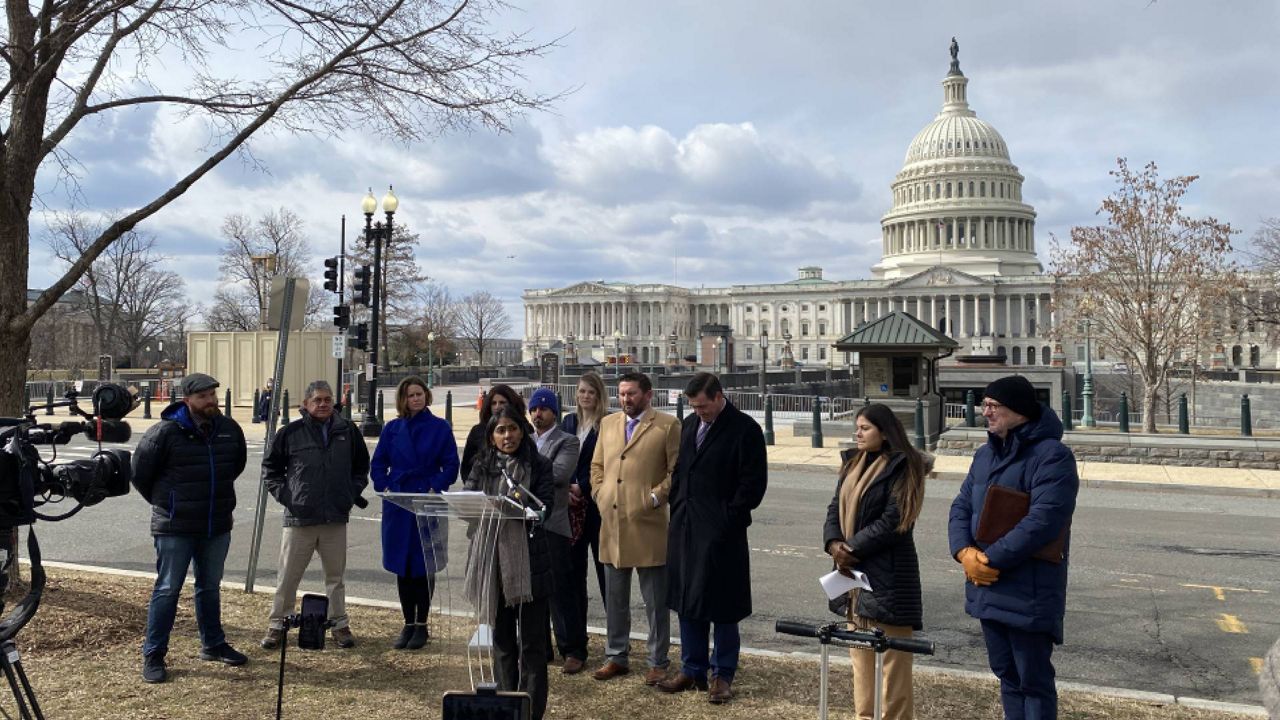Immigration advocates and veterans are ramping up calls for Congress to pass an Afghan adjustment act — legislation that would secure permanent status for the thousands of evacuees living in the United States — illustrating what they say is an urgent need to save Afghans from legal limbo as they resettle.
A coalition of advocacy groups gathered outside the U.S. Capitol in the cold and light snow on Monday to call for the legislation, which is in the draft stage and has yet to be introduced.
Thousands of Afghans whom American troops evacuated out of Kabul in late August have resettled in the U.S. under humanitarian parole, a status that currently allows them to work and live in the country but expires after two years, requiring them to apply for permanent residency through another program.
Congress has, for now, directed Afghans to apply for asylum and mandated their applications be processed more quickly than usual. But advocates point out that the asylum system is already backlogged with more than 400,000 applications, and most Afghans are already about six months into their parole.
“They should not have to wonder if one day they'll be forced back. Let's promise them that they are safe,” said Mike Jason, a retired Army officer and executive director for Allied Airlift 21, outside the Capitol on Monday.
Adjustment acts have precedent in Congress; lawmakers passed one for Cubans in 1966 and another in 1977 for refugees from Vietnam, Laos and Cambodia.
To date, 74,000 Afghans have resettled around the United States, according to a Department of Homeland Security spokesperson. Some are eligible for a visa because of their work with the United States, but the majority of evacuees are still in legal limbo.
Immigration advocates on Monday said that worrying about securing permanent status is another unnecessary burden on Afghans during the resettlement process.
“On top of all of the traditional challenges of resettling … they worry about how they can possibly find and afford a lawyer to navigate a deeply complex asylum system,” said Krish O’Mara-Vignarajah, president of the Lutheran Immigration and Refugee Service, which has helped settle 10,500 evacuees since last summer.
“After facing so much trauma already, this legal limbo is an unwarranted source of stress and sleepless nights for our new Afghan neighbors,” she added.
A spokesperson for Rep. Earl Blumenauer, D-Ore., who is drafting the Afghan adjustment act in the House, said conversations are still ongoing and they hope to introduce an official bill in the “next few weeks.”
One hold-up, they said, is finding a Republican co-lead for the adjustment act, since bipartisan support would make it easier to roll the measure into a larger government spending bill.
Republican Rep. Michael Waltz of Florida — a Green Beret who served in Afghanistan and has supported other legislation to aid Afghan allies, such as interpreters — is reviewing the draft and will make a decision whether to support the legislation once it has been introduced, according to Waltz’s communications director James Hewitt.
Senators Chris Coons of Delaware and Amy Klobuchar of Minnesota are leading the effort in the upper chamber.
Advocates on Monday called the need for an adjustment act “urgent” and said they believe it could also get Republican support.
“There are not enough immigration lawyers in the U.S. to take on 76,000 Afghan humanitarian parolees at once,” said Susannah Cunningham, who leads advocacy at LIRS. “There is an urgency that we hope to express, and I think that is the missing piece — understanding the ticking clock.”
Veterans on Monday painted the need to secure status for evacuees as an extension of the promises that U.S. troops made to Afghan interpreters and others who aided Americans in Afghanistan over the years.
“There is no issue that unites veterans and those in the national security space across this country quite like this,” said Shawn VanDiver, who leads the #AfghanEvac coalition. “We need our representatives to stand with us to ensure that we're able to follow through on the commitments that we've made.”
While 74,000 have resettled, about 1,600 Afghans remain on two military bases in the U.S. awaiting resettlement, the DHS spokesperson confirmed, including 200 at Fort McCoy in Wisconsin and 1,400 on Joint Base McGuire-Dix-Lakehurst in New Jersey.



